Barbara Rainey's Blog, page 7
June 12, 2023
Lies You May Believe About God: If I Do My Part, God Will Answer My Prayers

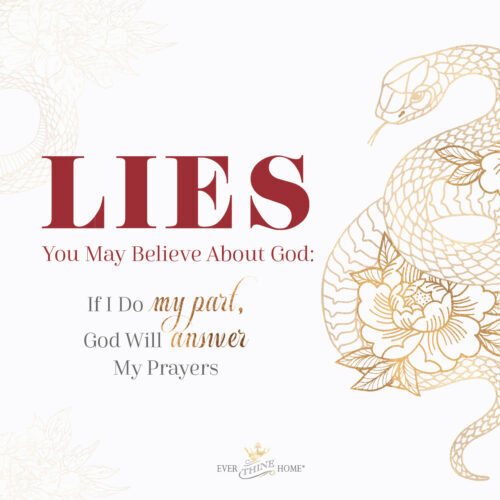
As a new Christian, and a few years later as a new wife, I eagerly prayed for everything. God graciously allowed me to see answers in those early years of faith because He knew I needed to see some evidence. Little children need much encouragement.
Without fully realizing it, I developed a formula. In all the Scriptures about prayer, I thought, there had to be a key, a secret to unlock the power of God. I was living my life with a reasonable, logical assumption about the Christian life. Here was my plan:
Do my best.Follow the rules—especially the Bible’s rules.Pray.Wait for God to bless my work and my efforts.And I just knew that, even if I didn’t do things perfectly, God would still give me what I desired that was good. Early in my Christian life I memorized Psalm 37:4, “Delight yourself in the Lord, and He will give you the desires of your heart.” I reasoned: God knows my heart and I want HIs best, therefore He will give me the desires of my heart, aka answered prayers.
I believed a common lie, that prayer is how we convince God to work on our behalf.
Over the next two decades prayer became more confusing than anything else in my Christian life. I read many books on prayer. I went to Bible studies and we rarely missed church. I spent a season or two fasting. I formed two prayer groups for moms. And I prayed with persistence like the woman in Scripture who pestered the unrighteous judge (Luke 18:1-8).
But in all of this spiritual effort it seemed He was deaf or had closed His ears to my begging pleas because:
Still our granddaughter died.Still our prodigal left home and pursued a destructive lifestyle.Still our daughter was date-raped.Still our son is physically handicapped.Still my heart was faulty for 40 years.Still cancer came uninvited.In all this and more I have experienced deep pain that felt impossible to bear, more times than I ever imagined I would.
Over time I learned that God’s silence to some of my prayers was His reply. I don’t have to understand. His inspired words provided comfort, answers, and hope. Romans 1:17 tells us, “The righteous shall live by faith.” And Psalm 46:10 reminds us to “Be still, and know that I am God.”
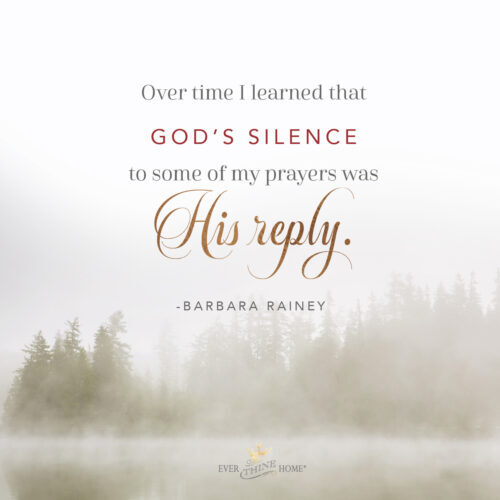
When I wrote on this topic a few years ago, one reader sent me a quote by Oswald Chambers from his classic devotional book, My Utmost for His Highest. “If we pray only because we want answers, we will become irritated and angry with God,” Chambers wrote. Have you felt that way? I sure have and Chambers is right. If our goal is checking off answers, adding up prayer victories, we are not seeking God for Himself, but for what He can do for us.
Oswald Chambers continues: “We are not here to prove that God answers prayer, but to be living trophies of God’s grace.” God is not a vending machine but a Father who wants a personal relationship with us. And for that to happen we must become more like Jesus, surrendered to His will which makes us “trophies of His grace.”
Today in the face of a long list of unanswered prayers I find comfort in knowing my Jesus understands because while on earth He felt what I have felt.
At the Garden of Gethsemane, the perfect Son—who had never entertained even one sinful thought, who had perfect communion with God the Father, who obeyed God’s will completely—was troubled because He knew He would soon be arrested, tried, and crucified. He prayed, “My Father, if it be possible, let this cup pass from me; nevertheless, not as I will, but as you will” (Matthew 26:39). He did this not once, but three times.
And God said nothing. NOTHING!
The answer was a silent no because God the Father had a higher good in mind.
And so He does with my life. Isaiah 55:9 tells me, “For as the heavens are higher than the earth, so are my ways higher than your ways and my thoughts than your thoughts.”
If I had found a key to prayer I would have depended on the formula, not on my Father. My desire today is to listen and follow the Holy Spirit’s lead all day every day as Jesus did. Jesus said He did nothing on His own initiative. To be more like Jesus is my goal. It’s taking decades.
God wants a relationship with me. It’s a headshaking truth I still can’t get over. But I know it’s true.

A real relationship demands that both individuals know each other. He knows me but I must learn to know Him. And so all my life God has been showing me Himself, not at all in the ways I might have expected or wanted, but by refusing to adhere only to what I imagined Him to be, I have discovered a God who is incomprehensible but oh, so personal.
And the greatest delight is how I love Him and treasure Him. I don’t need answers for the issues in my life; I don’t need to know why. I have Him. Even in the hard things yet to come He will be with me. He will be my stability.
I hang on to these beautiful words I love from Habakkuk 3:17-18:
Though the fig tree should not blossom,
nor fruit be on the vines,
[Though] the produce of the olive fail
and the fields yield no food,
[Though] the flock be cut off from the fold
And there be no herd in the stalls,
Yet I will rejoice in the Lord;
I will take joy in the God of my salvation.
Habbakuk resolved to trust God and rejoice in knowing Him even if every crop should fail leading to economic catastrophe and famine. And he asks us today to do the same.
Prayer still remains a mystery to me and I imagine it always will. Even though it’s an enigma I still talk to God a lot, more than in my younger years. I’m learning to watch for hints of His orchestrating hand and I’m giving thanks in everything because I believe He knows and is intimately involved in every detail of my life, even when I can’t see it.
One day all things will be made new. All will be made right. There will be no more tears or sorrow or loss.
Until that day, God asks that I surrender all to Him and trust Him as I live in this broken world that He is working all things for good, even when I can’t see or understand how or why.
This world is not our home!
If this post helped you, you would also enjoy our new online video study titled, Cultivating Hope In Times of Hardship and Disappointment . This series, with five video messages and a free downloadable workbook, is a compilation of many of the lessons I’ve learned in my 50 years of following Jesus as His disciple.
In this study I explore:
The story from John 11 of Mary and Martha and their disappointment with Jesus after the death of their brother Lazarus.8 ways to nurture faith and hope in the dark times of life.Keeping hope alive.If you are curious to learn more I’d love for you to watch the video series and learn more about cultivating hope when you’re going through hardships and are disappointed in God. It’s available now !
The post Lies You May Believe About God: If I Do My Part, God Will Answer My Prayers appeared first on Ever Thine Home.
June 5, 2023
Lies You May Believe About God: “God Never Causes ‘Bad Things’ to Happen to Us”

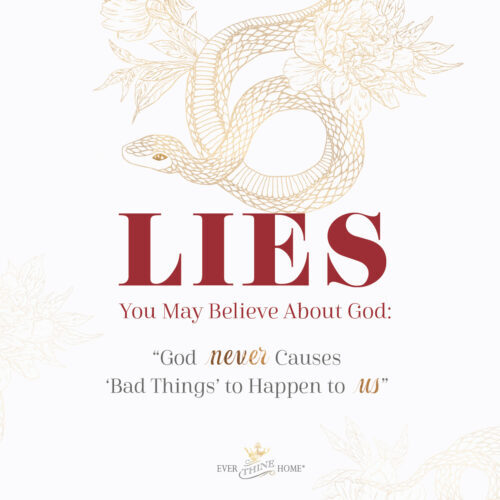
Did you grow up hearing fairy tales read to you? Or did you play pretend games imagining you were a hero or heroine? Did you remember wondering if the invisible, mysterious God you heard about in church was just another myth—or was actually real?
I loved fairy tales and make-believe stories as a child. There were hints of truth in all of them, and I especially loved the “happily ever after” endings because that is what I longed for one day—a safe, secure, predictable world.
But somehow those stories became woven into the concepts I learned about God in church. I developed, years later, what I began to call “fairy-tale theology.” From those childhood tales I began to imagine God as a benevolent grandfather who loved me and waited to reward my desire and effort to do things the right way.
In college, I was introduced to the concept of inviting Christ into my heart and I immediately knew it was what I’d always longed for: a confidence that I belonged to Him. As the gospel was explained to me it was all about how much God loved me and that He had a plan for my life. It was music to my ears. And one of the first verses I heard was a quote by Jesus Himself: “I came that they might have life and have it abundantly” (John 10:10). Again I responded with an enthusiastic yes!
The problem was this promise of abundant life fit closely with my fairy-tale image of God as a benevolent grandfather and this assumption didn’t always line up with my real-world life. I couldn’t understand why I still experienced hardship. It didn’t seem to fit with my vision of this “abundant life.”
What about you? Have you too been confused about God and the way He works or doesn’t work?
I realize now that I believed a very common lie, that God never causes “bad things” to happen to us.
Many who believe in God assume He knows our hard world and knows we mean well. And like the fairy godmother in Cinderella, He wants to wave away our poor circumstances with His magic wand and show Himself miraculous. All with a happy ending, of course.

This issue touches on one of the most difficult theological questions in the Bible: the dilemma of a loving God who allows hard and painful things to happen, especially to those of us who, from our own perspectives, are trying to do right and be a good person. Delving into this question requires deep thinking and reading all of the Bible, not just select verses, to even begin to understand who Almighty God is and then to glean hints of why He allows difficulty, pain and loss. So let me focus on just one slice of this issue that I think is easier to grasp.
One night years ago my husband, Dennis, and I went out for a dinner date and left our youngest children, 15 and 14, with one simple instruction: Don’t watch TV and get your homework done. As I walked out the door I added a P.S.: “And if you finish your homework early, read a book. No TV.”
Pulling into the driveway several hours later, we saw the blue glow of the television screen through the window. To be sure we had the upper hand I stood in front of the window watching them glued to the screen while Dennis walked in the back door calling out, “We’re home!”
Instantly, they jumped into action, turned off the TV and hopped into chairs with books, like innocent angels.
“How was your evening?” Dennis asked
“It was great!”
“Watch any TV?”
“On no, Dad.”
“Ah … then I want you to look out that window and wave at your mom who was watching you before I came in the door.”
For one entire month, these two lost their media and friend privileges—no TV, no phones, no sleepovers. This was their penalty for boldly lying to us. From their perspective, our discipline was the worst—extreme and unfair! How could we do this to them? A whole month? None of their friends had parents so strict! They didn’t really mean to disobey, they said. Couldn’t we believe the best about them and give them grace?
But our decision stood because we valued their growing understanding of the nature of sin. If God hates lying—as He said He does in Proverbs 6:16-17, “There are six things the LORD hates, … haughty eyes, a lying tongue …”—then we as parents must also.
Our two teens thought we brought unnecessarily hard, painful circumstances into their lives. But as children, they couldn’t see our adult perspective—that our disciplinary actions were actually good and needed for their development in maturity.
A difficult passage
Just as we do with our children, God repeats Himself many times in the Bible to make sure we hear Him clearly. In chapter 45 of Isaiah, God repeats an authoritative phrase four times: “I am the Lord, there is no other.” God is reminding His children that He is their Maker and Creator and therefore that they owe Him respect and gratitude for all He’s given them as their Father. But what God saw in His children was idol worship and devotion to the popular beliefs of the day, instead of loyalty and gratitude to Him. And He knew they needed correction.
Also in the greater context of this chapter is the overall message God spoke through His prophet Isaiah. God was warning them as a concerned parent: If they continued to choose idol worship, practice injustice, and just go through the motions of “church,” then judgment or discipline would come. Why? Because Creator and Father knows their behavior needs to be corrected for their own well-being. The parenting reference is obvious.
Now the hard passage in this context. Isaiah 45:6-7 says, “I am the Lord, and there is no other, the One forming light and creating darkness, causing well-being and creating calamity; I am the Lord who does all these” (NASB).
“Creating calamity?” How do those words make you feel? When I first read this passage I was shocked and felt confused, even anxious and fearful. It didn’t fit with my “fairy-tale theology” image of God as my benevolent rescuer.
So what is “calamity”? Simply put, it is anything that upsets our personal world order, like the discipline we gave our teens. To them, it was a calamity.
God made us to have a personal, one-to-one relationship with Him and He will pursue us relentlessly to win us back. John Eldridge coined the phrase “a sacred romance” to describe the relationship God desires to have with us.

And when His children become obsessed with endless distractions, God sometimes “creates calamity” to help us see all the petty things we thought so important are not. He is sovereign and is always orchestrating situations with the good and loving purpose of calling men and women and children to Himself.
Just as parents discipline their children to help them grow into righteousness, God brings calamity—things we may consider “bad”—into our world in the form of godly discipline to make us more like Christ. The writer of Hebrews said it this way, “… God deals with you as with sons; for what son is there whom his father does not discipline?” And the author adds, “if you are without discipline … then you are illegitimate children and not sons.” (12:7-8).
Deep down inside our teens knew we loved them when we delivered our discipline to them. And so we who are Christ followers can know, not necessarily feel, God’s fatherly love when we too encounter hardship from His hand.
May you too know your Father loves you even when He sends calamity to your world. May you reject fairy tale theology and embrace the hard truths of Scripture. And as a result may you know Him as He is and love Him more.
You may wonder, “Does that mean everything hard and difficult in life is a discipline from God?”
Because this post is already long I’m going to answer this follow-up question in another post that we’ll make available to our paid subscribers on Substack. Why, you may ask?
In the past, all our online content was free because we were funded by product sales and donations. Since we retired from FamilyLife five years ago, Ever Thine Home has grown in impact and in size (we have a team of six, five of whom are part-time). And we’ve been trying to figure out how to “float this boat” God has given.
Last fall we decided to try a new platform called Substack which offered many benefits and also gave us the option to offer paid subscriptions as a way to supplement our donations. We launched in January and are still working to figure out the best combo of free content vs. paid content.
So the answer to this question, “So does that mean that everything hard and difficult in life is a discipline from God” will be available tomorrow to paid subscribers because it’s an extra post that supplements the first one which is free.
I hope that makes sense and helps you understand why our content is not all free. We think $5 a month for more food for your soul, which will nurture your life in Christ, is well worth it. Hope you agree and I’d love to hear from you if you read the bonus post on Substack tomorrow!
I’d love to hear what you think of this post. Just click on the comment button.
The post Lies You May Believe About God: “God Never Causes ‘Bad Things’ to Happen to Us” appeared first on Ever Thine Home.
May 22, 2023
Pentecost: The Forgotten Celebration

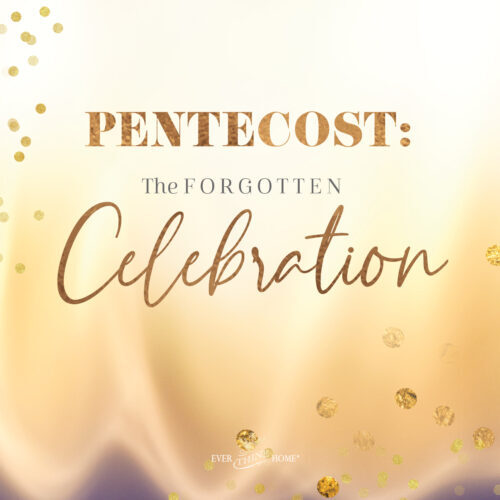
As you have probably noticed, holidays are important in my life and in the life of my family. I’ve invested a good amount of time to find creative and memorable ways to mark these annual faith-based days on the calendar because they have roots in the Bible’s story and therefore are important to our faith today.
In the Old Testament, God gave His people seven yearly feasts. These holidays anchored human interactions with God and His people over days set aside for celebration and for worship. God’s goal for His people was concentrated, intentional time to delight in Him, to remember His love and work on their behalf, and to stoke their relational fires with Him through memorable moments away from everyday demands.
God’s original feasts punctuated ordinary life with hours of significance and meaning. And some of our Christian celebrations echo the original Jewish feasts. For example, the Jewish holiday of Passover commemorates when Moses told the captive Jews to paint lamb’s blood over their door frames so that God would pass over their homes when Egypt was struck with the tenth plague—death of their firstborn children. Today, Christians celebrate Easter, when Jesus died so that God would “pass over” our sins. In fact, it was no coincidence that the death of Christ occurred on Passover; He was the sacrificial lamb of God.
The connections of Christmas with the original feasts is slim, though it does line up in some ways with the Feast of Hannukah. But I find it odd that one of the most important Christian celebrations of the year is barely mentioned in churches today: Pentecost. This was one of the three feasts which required travel to Jerusalem annually. The celebration foretold the coming of the Holy Spirit. This holiday commemorates the giving of the Holy Spirit to the apostles, Jesus’ disciples and to us. Acts 1:4 records:
And while staying with them he ordered them not to depart from Jerusalem, but to wait for the promise of the Father, which, he said, “you heard from me; for John baptized with water, but you will be baptized with the Holy Spirit not many days from now.”
The apostles waited 10 days for this promise to be fulfilled:
When the day of Pentecost arrived, they were all together in one place. And suddenly there came from heaven a sound like a mighty rushing wind, and it filled the entire house where they were sitting. And divided tongues as of fire appeared to them and rested on each one of them. And they were all filled with the Holy Spirit and began to speak in other tongues as the Spirit gave them utterance. Acts 2:1-4
Jesus dramatically fulfilled His promise when He sent His Spirit. When we receive Christ as our Lord and Savior, the Spirit comes to live within us and give us the power and guidance we need to walk with Christ. And the Spirit has been coming to indwell believers in Christ ever since. So why don’t we give thanks for the miraculous event of Pentecost?
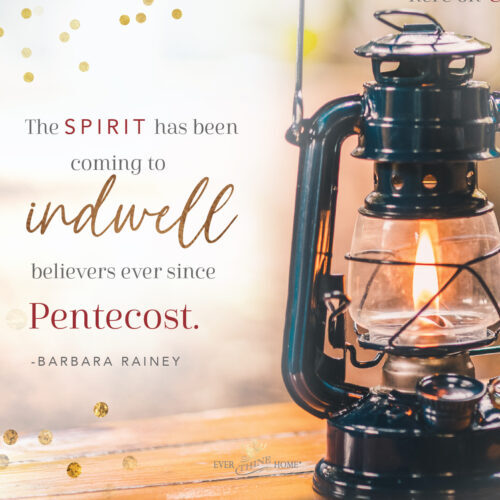
In preparation for Pentecost this year on Sunday, May 28, here are some reasons why it is a wonder worth celebrating.
Having the Holy Spirit is better than having the physical person of Jesus! That may sound strange to say, but Jesus said, “Nevertheless, I tell you the truth: it is to your advantage that I go away, for if I do not go away, the Helper will not come to you. But if I go, I will send him to you”(John 16:7). Jesus was confined to a body when He lived on earth. He could only be in a single place at a time. But the Spirit is in every believer in every place around the globe. Amazing!The Spirit will be “with us forever” (John 14:16). I am so grateful for this promise that He is always with me, whether on a flight that is disconcertingly bumpy, or when I’m feeling like “I can’t do this anymore,” or when I’m simply completing mundane, thankless tasks for the thousandth time. His ever-presence is a comfort.We can know His constant, gentle whisper. The Spirit continually, intimately reminds me of what Jesus taught. Jesus said, “But the Helper, the Holy Spirit, whom the Father will send in my name, he will teach you all things and bring to your remembrance all that I have said to you”(John 14:26). He loves to remind us of what Jesus said that is exactly what we need to hear.Like taking a trip to a national park where park rangers provide maps and guidebooks, so the Holy Spirit will guide us into His truth (John 16:13) throughout our unique, obstacle- and adventure-laden journey of life, if we will ask.Though there are many more reasons why the Holy Spirit came, but one of my favorites remains this: “the Spirit Himself intercedes for us with groanings too deep for words” (Romans 8:26). There have been many times in my life when I have not known what to pray because I was bewildered or afraid or in pain. Yet in those times the Spirit was praying for me. What a Comforter is the Spirit who was given to us, sent to us from the throne room of God!Will you join us in celebrating this underappreciated gift from the Father? Here are three ideas you can implement with your family:
Create a simple obstacle course in your living room or backyard. Blindfold each child one at a time and instruct them to find their way across the room or yard by listening to your voice calling directions. The blindfolded one has to listen carefully to your voice or he will trip or bump into things. Talk about how this is like listening to the Holy Spirit’s voice.To further illustrate this for the next person’s turn in the obstacle course have another family members call directions at the same time, which teaches a very practical lesson in learning to follow one voice as opposed to many other “voices” that might influence our lives.
Bedtime reading. Because most children love to delay bedtime by talking, take advantage of this by talking to them about the Holy Spirit. (Or read these in conjunction with your dinner or obstacle course.)At the last supper, Jesus prepared His disciples for what was to come. In that conversation He made several important promises, including several about the Spirit and what He came to do: John 14:16-17; John 14:26; John 16:7, 13-15. Read these passages to your children and ask them to make a list of what Jesus promised His Spirit will do. If you have older children and teens this can become a very in-depth and beneficial discussion as you find other verses beyond these three, learning together how vital is the Holy Spirit and His gracious work in our lives.
Teach the concept of being filled with God’s Spirit. Read Ephesians 5:17-19 and talk together about this command from Paul to everyone who is a Christian. What does it mean to be filled with the Spirit? Why does God tell us to do this? How does being controlled by God’s Spirit make a difference in your life, or how should it make a difference? (For more information on the Holy Spirit, read “The Wonderful News of the Spirit-filled Life,” by Bill Bright.)
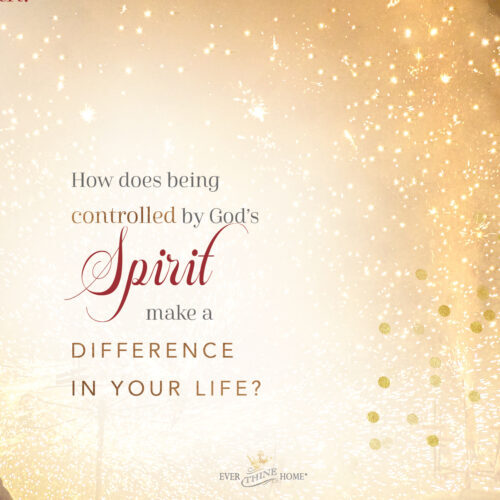
At Ever Thine Home our hope is to not only elevate Easter but also to call us as women who desire to make our homes His embassy to celebrate these holy holidays on the Christian calendar with our families and friends.
We hope that adding even one of these ideas to your Pentecost Sunday will help you appreciate the wonder of God residing within each of us who believe in Him.
May you enjoy Pentecost Sunday as you celebrate the miracle of God’s continual presence with us.
P.S. Watch for our new Bible study on the Holy Spirit coming out this fall!
The post Pentecost: The Forgotten Celebration appeared first on Ever Thine Home.
May 15, 2023
Happy Ascension Day! 4 Reasons This Critical Event Deserves a Celebration of its Own

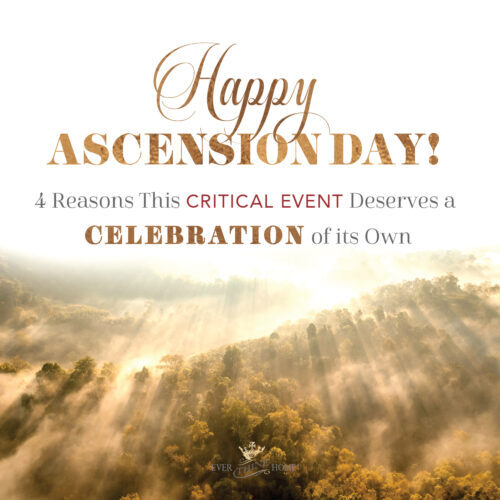
This Thursday, May 18, 2023, marks 40 days since Resurrection Sunday. That historical moment is called Ascension Day, the day Jesus left the earth for heaven.
But for most followers of Christ, Ascension Day is uncelebrated, unnoticed, even unknown. As one reader told us, “I was not even aware of a celebration of Ascension Day until last year. Goodness! What an important day to observe and celebrate.”
We know the Easter story, but do we know the ascension story? For centuries too many have missed this critical event that deserves a bit of hoopla of its own—for at least four major reasons.
The ascension of Christ signals Jesus’ momentous completion of His Father’s will and work here on earth.
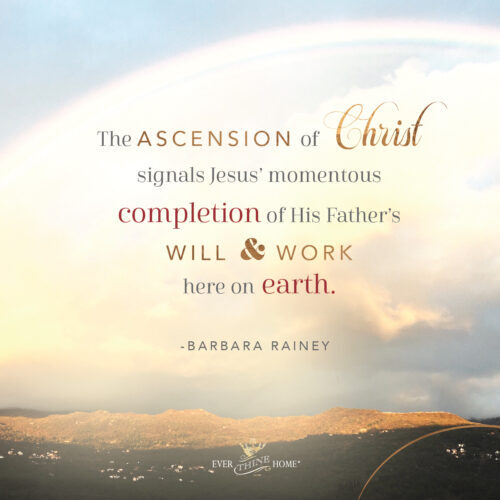
God always works precisely and intentionally, yet all that He did in those 40 days was not recorded. And don’t you wish we knew more of His work after the Resurrection?
We do know after the Resurrection that Jesus appeared many times to His followers. In that first week several appearances are recorded in the Gospel accounts. Then Paul records a list of others: “… He appeared to Cephas, then to the twelve. Then He appeared to more than five hundred brothers at one time …” (1 Corinthians 15:5-6). It is clear He demonstrated His deity to hundreds. I imagine everyone listened intently to His every word, knowing He had risen from the dead. Wouldn’t you?
We can be sure Jesus continued to fulfill the Father’s purposes in those 40 days by preparing His followers for the church age to come. Then on that 40th day He spoke His most important last words: “you will be my witnesses in Jerusalem and in all Judea and Samaria, and to the end of the earth” (Acts 1:8). The baton was passed from His physical presence in a single location, a single body—to the Holy Spirit’s transforming presence in all believers from every tongue, tribe, and nation.
This command is often called the Great Commission. It’s the great responsibility of every believer to share the Good News of Jesus. When I was in college and learned about Jesus, I eagerly gave Him my heart and life. But I also learned almost in the next breath about the Great Commission, the opportunity that was now mine to be part of changing the world by introducing many to Him. It made sense … there were so many others just like me who didn’t know Him.
After college graduation I joined a ministry called Cru and have been part of a lifelong calling to make Him known. Just a couple weeks ago I traded texts with Jane, a woman who was one of my first disciples after God gave me the privilege of telling her how she could know Jesus. And she’s been walking with Him ever since. It’s been a great joy to watch her from afar making a big impact as the women’s ministry leader at her church.
Celebrating Ascension Day means celebrating the wonder of His call to use each of us in ways as amazing and significant as His first century disciples.
Ascension Day also signals the beginning of Jesus’ intercession for us before the throne of God! Hebrews 7:25 tells us, “He is able to save to the uttermost those who draw near to God through Him, since He always lives to make intercession for them.” Every accusation made by our enemy, the father of lies, is met by the living Christ’s victorious rebuttal before the seat of all authority in heaven. Now that He resides in heaven once again, “God has highly exalted Him” (Philippians 2:9). What bold confidence that should give all of us who love Him—to know He is defending us always! His Ascension opened the door for the sending of His Spirit. Jesus said plainly, “… I tell you the truth: it is to your advantage that I go away, for if I do not go away, the Helper will not come to you. But if I go, I will send Him to you” (John 16:7). I’ve written an entire post on this topic called, “Why the Holy Spirit Is Better Than Jesus,” not to divide the Trinity, but simply to explain the benefit to all of us that we have the Spirit who is in and with each one of us simultaneously while Jesus could only be in one place at one time confined as He was to a physical body.There is so much more to say about the Spirit and His coming at Pentecost. But for now we are planning to release a Bible study on the Holy Spirit soon! Understanding the person of the Spirit and His work in our lives is crucial so join us for this new study.
Most exciting for me personally, the Ascension signals the commencement of a future-filled promise. John 14:3 reads, “And if I go and prepare a place for you, I will come again and will take you to Myself; that where I am you may be also.”For over 40 years I’ve carefully decorated and redecorated my own home; therefore this idea of a place prepared for me—by Someone who knows the depths of me better than I do—fascinates me.Someone once said, “if He’s been gone two thousand years, what mansions must He be preparing for us for all those years, and He’s not finished yet!” It’s beyond my imagination. Still the simple hope of that beautiful glittering possibility reminds me to anticipate all that lies ahead with expectation and joy. The Ascension was simultaneously a striking ending and a marvelous beginning.
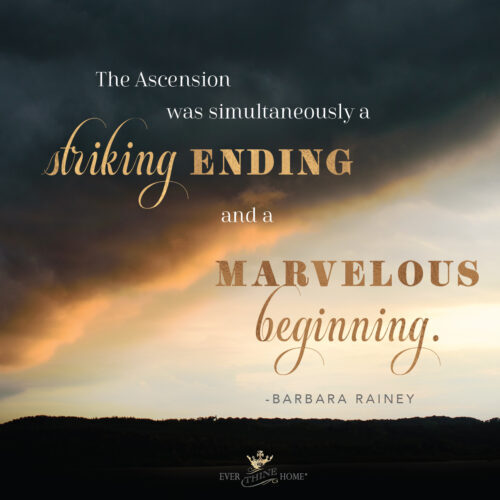
These four promises related to Ascension Day make me want to throw a party!
Remembering the benefits that are mine because of Ascension Day is a great encouragement to keep looking up because as the angels said to the disciples, “This Jesus, who was taken up from you into heaven, will come in the same way as you saw Him go into heaven” (Acts 1:11).
Hebrews 12:1-2 tells us to “run with endurance the race that is set before us, fixing our eyes on Jesus, the author and perfecter of faith.” This fits perfectly with Ascension Day. Where should I be fixing my eyes? On Jesus. And where is He? Up! He is in heaven, so lifting my eyes to heaven, looking up, brings hope to my soul in these days of immense change in our world.
May you find a way to mark this day in your life. Read the story in Acts 1. Remind your family or friends about this day and what it means for you as a believer. And for six specific ways to celebrate with your family, click here.
Happy Ascension Day!
The post Happy Ascension Day! 4 Reasons This Critical Event Deserves a Celebration of its Own appeared first on Ever Thine Home.
May 8, 2023
3 Steps to Getting Along With Your Mother-in-law
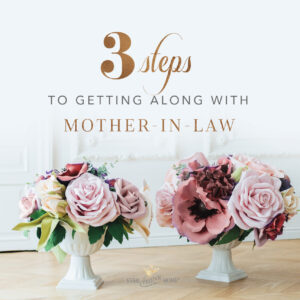
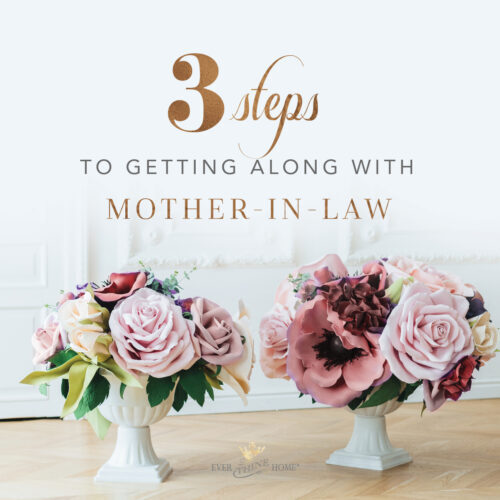
All six of our children had adjustments and challenges with their in-laws. Everyone does. We did too.
My mother-in-law and I could not have been more different. It seemed we had nothing in common. Her favorite hobby was fishing. She loved watching golf on TV. Both activities were foreign and of zero interest to me.
And not only was her generation radically different, but my family of origin was nothing like hers, which was very poor and not college educated. But she had a sense of humor. The problem was I didn’t get it. What they all thought was hilarious I didn’t.
She was kind to me and I respected her and appreciated her good parenting, memory making and cooking. I never felt close to her and in hindsight much of the blame was on me. I had no idea how to bridge the many gaps, so I stayed safely on the fringes, asking no questions and letting my husband, her son, have all the attention.
In our situation we lived hours apart, which greatly limited expectations on both sides. But that isn’t the case for many. So when your new husband tells you something like, “We go to my parents for lunch every Sunday,” and you had no idea it was expected weekly with no end date ahead, that creates instant tension.
Because expectations are almost always unspoken, mistakes are common on both sides of this often-strained relationship. Here are three tips for getting along with your mother-in-law or father-in-law.
Don’t assume motives.As I wrote to the mothers-in-law in my post last week, I repeat to you daughters-in-law what I heard from a Christian counselor: “When we assume the motives of someone else, we are wrong most of the time.” It’s easy, for example, to feel like your mother-in-law is always taking your husband’s side in a conflict. It feels like she’s not actually trying to know you, that she’s merely working to fold you into her world rather than supporting you both.
There may be some truth to your gut feeling, but are you sure you are 100 percent correct in assuming your mother-in-law’s motives? If my counselor friend is right—and she has far more experience than I in coaching relationships—then you may have a few assumptions right but most are wrong.
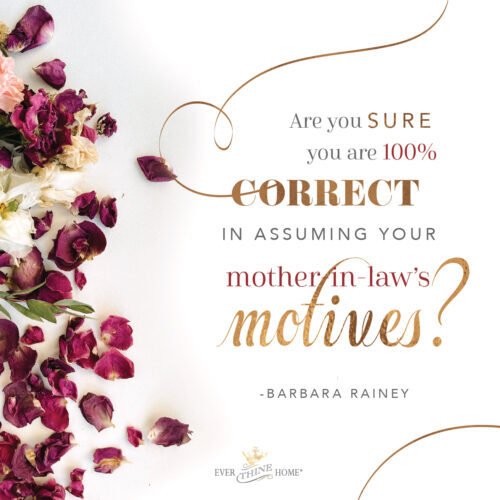
Here is a truth about almost all women whose children are grown and between the ages of 50-60: They are in a season of lost identity. Her old job as mom and as the parent who knew everything about her kids and their lives has suddenly changed for good.
The loss is not just of kids, but of youth, parents and family members, a job or career, and of normalcy in marriage. Or perhaps your father-in-law recently retired and he’s driving her crazy. Or vice-versa! Because of these losses many mothers-in-law are experiencing an identity crisis. Many are depressed and lonely in this stage of life. This probably describes your new mother-in-law though she herself might be unaware.
The truth is that all mothers-in-law are broken. We humans are living in a fallen world, raising kids who are fallen including the one who you recently married. Sin does not stop in this life.
Making the situation more challenging is that some mothers-in-law are not believers or have never learned to understand grace and forgiveness. They are still living with a performance perspective, still trying to prove their worth … and now want you to prove your worth as well.
Or maybe your mother-in-law is of another faith, cultural, ethnic, or regional background. The two of you probably could not be more different. That in and of itself is a setup for misunderstanding. Personalities, histories, gifting, emotional balance, losses, and our individual stories all factor into this complex relationship.
Conclusion: What you see today is definitely not all there is. So don’t assign motives to your mother-in-law. You only know a thin slice of the whole truth. Courageously ask God to help you see her more clearly with His eyes and heart.
Be teachable.The most important quality you can own and grow for life is teachability. To recognize your inabilities and personal needs is the first step toward godly maturity in marriage and with your mother-in-law.
Failures, mistakes, and misunderstandings in relationships stop us in our tracks. We stall, assessing what went wrong, whose fault it was and what to do next. Difficulty and relational pain always present a fork in the road.
One road is labeled “I can do this.” Shame, personal self-ridicule, and anger become fuel which feeds a vow to redouble your efforts so the offense never happens again or never hurts you again.
The second road is labeled, “I can’t do this.” You feel the embarrassment of this failure while equally seeing clearly your inability to generate good toward this person. But instead of turning within to your personal task master, you take your whole self to God, the author of all relationships. Recognizing your lack of love, your inability to even be nice to this woman, is a very healthy place to be. It’s where you go with that knowledge that makes all the difference.
Being teachable means going to the power source of lasting life change. Many times in my life I have asked God to give me His love for others, even my husband, because I couldn’t produce love on my own. And there were times I didn’t want to love the person who’d offended me. Feeling justified that I was right felt much better in the moment. Augustine wrote, “Heal me of this lust of mine to always vindicate myself.” So true of me and you.

God has made it clear we are to honor our parents (Exodus 20:12). First you must make the decision to get along with your mother-in-law in spite of how you feel about her. He will help you find ways to honor her … to get along with her … if you chose the “I can’t do this on my own” road.
A word of caution: Choose your words carefully when you share your frustrations or anger at your mother-in-law with your husband. He has a natural and normal loyalty to her and may find it hard to reconcile his love for his mom and his love for you. Perhaps talking to someone older and wiser or a therapist first will give you language to use to help him understand you with grace and truth.
Conclusion: In the end, refusing to humbly go to God, refusing to ask for His transforming love, only adds bricks to an invisible wall between you and your mother-in-law or other relationships. And eventually these walls—built for protection—become a prison. Choose to be and remain teachable.
Trust in God.In the Old Testament we find the story of Ruth, who chose her mother-in-law over her own family and home. In Ruth I see a young woman who depended unreservedly on Someone greater than herself.
The story makes it clear that Ruth’s mother-in-law, Naomi, was not a happy person. Can you identify with having an unhappy mother-in-law? Naomi verbalized her outlook on life when she told her friends to call her Mara, which means bitter. Naomi’s life losses had produced a heart of deep disappointment, cynicism, and bitterness.
What makes Ruth a strong woman was not her personality but her absolute faith in the God of Israel to provide what she lacked. She knew Naomi was unpleasant and that she herself was an outsider to the family of God. But Ruth saw hope in God, her Redeemer, that surpassed any bitterness of her mother-in-law.
Do you think Ruth was exceptional? Did Ruth have strengths, gifts, or options you don’t have? No, she was just like you, but her faith in the unseen God was greater and more important than her mother-in-law’s unhappy attitude. Faith is what marked her as an exceptional praise-worthy woman.
Fix your eyes on Jesus, all of you who grit your teeth when with your mother-in-law. Ask God to give you His love and grace because yours simply is not enough and never will be.
Conclusion: If you choose God’s way of love above all else, you will make your life and the body of Christ more beautiful, just as Ruth’s faith made her “a woman of excellence” (Ruth 3:11), known by everyone in the city.
I pray this will be true of you too.
The post 3 Steps to Getting Along With Your Mother-in-law appeared first on Ever Thine Home.
May 1, 2023
Avoid These Three Mistakes to Become a Wise Mother-in-law


Why is it that one of life’s most difficult relationships is often between a mother-in-law and a daughter-in-law? Or sometimes a son-in-law?
Most of us have high hopes for these relationships before they become official. We imagine getting along, spending time together, and liking each other. And yet all too soon individual relationships suffer from misunderstandings, missed expectations both stated and unstated, and hurt feelings.
And most of the time it’s all unintentional.
I remember a comment a friend of mine made in her introduction at the start of a small gathering of leaders: “Human beings are meaning makers!”
All my life I’ve looked for meaning, especially the deeper, unseen significance in events, ceremonies, holidays, even details of God’s creation. So I was dazzled by the implications of this true and suddenly-obvious statement. I am made in His image, the Author and Creator … who as the Word is the meaning behind everything. So my search for meaning was and is always a search for Him!
What does this have to do with being a mother-in-law?
Simply this: These often troubled and ridiculed relationships are, at the heart level, a quest for meaning and value. When we don’t get along, when we believe the worst, when we retreat in fear and therefore withhold love, we miss the added value and delight God built into these unique relationships. Because we want meaningful relationships with these people—our people—the hurtful comment or disappointment is greater than the same from a total stranger.
Here are three common mistakes I have made as a mother-in-law; and I would guess some of you have too.
Mistake #1: Wrong assumptions
In the middle of a difficult moment with in-law relationships, it is very easy to assume the worst about a daughter or son-in-law. A Christian counselor friend once said, “When we assume the motives of someone else we are wrong most of the time.” I have learned this is very true.
We mothers-in-law often forget is what it’s like to be in their shoes. Remember when you were newlyweds or new parents? What did you want from your parents and in-laws? What did you wish for? It might be a good exercise to make a list of what you remember as a starting point for making changes in your relationships.
The danger of assigning motives, of assuming someone’s intent, is we never know all the facts. Our in-law children are new to our family. They come with their own often un-named values, beliefs, and assumptions about what we, their in-laws, should or should not do. Not to mention what their spouse—our child—should or should not do. And … they are still figuring out their young marriage. It’s very complicated.
The temptation is always to side with your own children, to assume they are correct, because we know them. But God is clear when He says, “You shall not be partial in judgment … For the Lord your God is God of Gods and Lord of lords, the great, the mighty and the awesome God, who is not partial …” (Deuteronomy 1:17; 10:17). Meaningful in-law relations can’t happen if we are assuming the worst or assigning blame without knowing all the data. And we will rarely have all the facts.
Conclusion: Choose to believe the best. Ask God to give you His love and grace and to help you give grace, expecting nothing in return.
Mistake #2: Impatience
We’ve had a lifetime to get to know our children, but when they marry we often have only a brief time getting to know their spouse. It’s all too easy to impatiently expect these grafted-in new members of the family to feel as comfortable with your family as everyone else. Relationships take time … lots of time with many investments of grace, love, and patience.
I was talking with my friend Joanne about lessons we’ve both learned in sibling and parent-child relationships, and she mentioned the phrase “healthy detachment.” I instantly knew what she meant and that I needed to hear this. I was feeling responsible to fix the rift between two of our adult children. I felt like I should … do… something … that doing nothing was neglectful, unloving. But in this case the breach was not mine to repair; I needed to detach myself from the situation and let them work it out.
Healthy detachment is loving and caring for your adult children. It means not letting their circumstances affect your daily well-being. This is not easy. I know. And it is painful. But it’s important that we parents continue to grow our faith in God, trusting Him to work in our children’s lives. Without our help!

“Waiting is not wasting,” Joanne also said. We want great relationships today. Now. And often God’s timetable is long.
Conclusion: We are not responsible anymore. God is more than able to work His will in their lives without our help. Our job now is to be patient with the process and trust Him to do the work.
Mistake #3: Defensiveness
When a child we have raised and loved and given our lives for points out a flaw he or she sees in us, it hurts. Our natural inclination is to be defensive, to explain our position and how hard we tried to do our best rather than just apologize and say, “I’m so sorry that hurt you so much.” We forget so easily that we are all flawed, broken people and no parent is perfect. So why are we surprised when our children grow up and notice?
This next statement isn’t natural but … instead of being defensive, Christian parents should be grateful for the opportunity to apologize for the mistakes we make! Even if it was 100 percent unintentional. Modeling apology and forgiveness will open the door for your child to do the same with you or with others. A friend once said, “Seeing a flaw in ourselves is a joy because we now have the opportunity to be rid of it.”
It takes maturity and humility to see our sin this way but it’s liberating.
Only when we own our mistakes with our kids and admit where we failed them will we grow rich relationships with them and with their spouses. The truth is always your friend.
Only humility produces the beauty of meaningfully deep relationships. And continually acknowledging our own sin and failure before God makes beautiful our lives and the greater body of Christ.
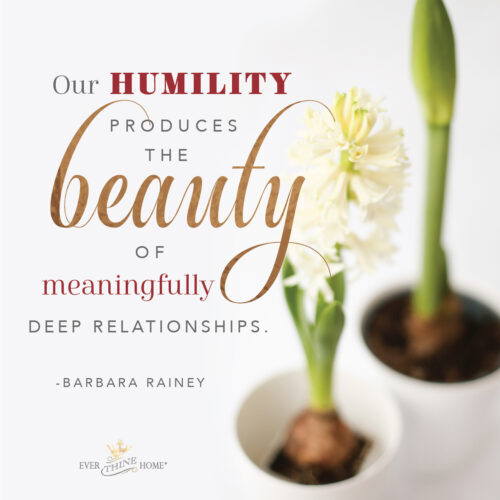
It’s been quite a journey with our six and their spouses since our first got married in 1997. We’ve known lots of misunderstandings and mistakes. Thankfully we’ve known forgiveness too. We love our kids so much, including their spouses. They each bring uniqueness which challenges us to greater faith, and that is always good.
He’s got us and He’s got our kids too!
The post Avoid These Three Mistakes to Become a Wise Mother-in-law appeared first on Ever Thine Home.
April 24, 2023
4 Questions to Help You Resolve Conflict
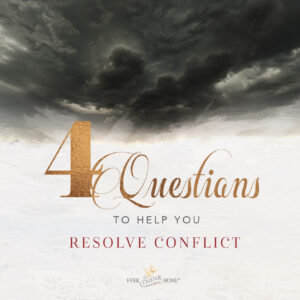
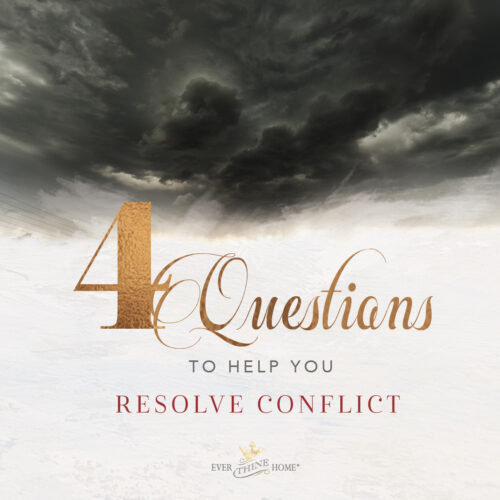
by Samuel Rainey
Note from Barbara: I’m pleased beyond words to welcome my son, Samuel Rainey, to the Ever Thine Home blog. I could write thousands of words about this man whom God has gifted uniquely to help men and women traverse choppy or turbulent waters in their marriages and lives. As a marriage and family therapist for 15+ years he has learned much in his practice of listening and listening and listening. Samuel is a man of deep wisdom, and it’s a delight and a gift to share him with all of you.
What’s the first thought or feeling that comes up for you when you hear the word “conflict”?
Fear?
Panic?
Memories of fights in the home growing up?
An urge that says, “It’s time to start running”?
For most people that I interact with in my counseling office, conflict brings up some pretty negative memories and experiences. Especially with couples who come in with years of unresolved conflict.
Here’s what I’ve found in the 15+ years I’ve been working with relationships: Conflict (like revenge) is always a dish best served cold. It doesn’t matter what the situation is or who it is with, when things get heated we humans tend to say and do some pretty stupid things.
The book of Proverbs in the Old Testament speaks frequently and pointedly to this very tension in relationships when it urges us: Don’t be a fool.
Here is a brief glimpse of what Proverbs says about the fool:
“… fools despise wisdom and instruction” (Proverbs 1:7)“… a babbling fool will come to ruin” (10:8)“… the mouth of a fool brings ruin near” (10:14)“The vexation of a fool is known at once, but the prudent ignores an insult” (12:16)“The prudent man conceals knowledge, but the heart of fools proclaims folly” (12:23)When we don’t take a time out (yes, a literal time out), we don’t allow space for the truth of what is happening in the conflict. The more heated we get, the less capable we are of understanding ourselves or the other person.
Escalating conflicts lead to treating each other like objects, not people. If they are an object, we can easily turn them into an enemy, or the enemy.
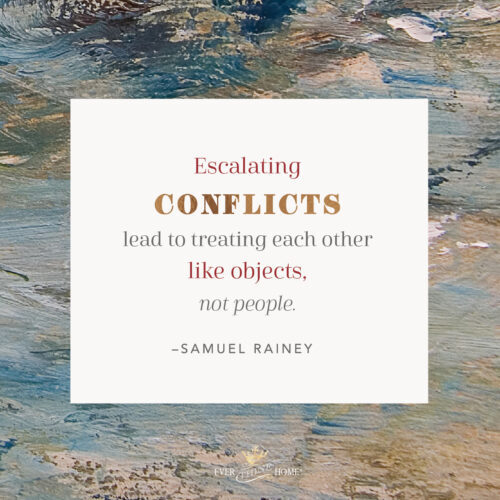
And guess what happens when they become the enemy? You become the last hope for humanity! We somehow convince ourselves that the fate of the world depends on our ability to strike down and defeat this enemy. Or you might feel like the other person sees you as the enemy and you refuse to give up on defending your honor, even if it will be the death of you.
It’s not always possible, but take a step back to pause before responding when you’re in a conflict. In some relationships, stepping back will cause hurt, but that might be the best of two difficult choices. If the choice is to offend by taking a step back or risk saying/doing something you can’t undo, then take the step back. Let the conflict cool down. Then attempt to reengage.
Here are four questions that can help guide you as you seek to resolve a conflict. These questions can be done on your own, or you can do them together with the other person. You might want a piece of paper to jot some notes down to help you clarify your perspective. At the end, to illustrate how this exercise can work, I’m going to tell you a story about a couple and a conflict they had.
When you’re answering this question about a conflict, begin with a brief prayer asking God to help you be objective. Ask Him to distract you from the speck of dust in the eye of the other, and to show you the log in your own eye (Matthew 7:3).
What happened? (data)Write down as much as you can recall about the incident, focusing on facts. And remember there are three sides to every story: Your side, my side, and the truth. Most all of us think that “my side” is the same as the truth. I hate to break it to you, but those are not synonymous. Your side of the truth is what you saw, experienced, and witnessed. Those are important, but don’t elevate your perspective with being the full, unadulterated truth.
As you will see in the example I provide below, this can be a bullet point list of what happened, or you can make it more of a narrative form. Regardless of your format, don’t interpret what happened; just write or consider the facts of what happened.
You might even want to try looking at the event through the eyes of the other person, or if you’re really brave, try looking at the event through God’s perspective.
What feelings came up? (emotions)The feelings I see come up with my clients regarding conflict include anger, guilt, fear, frustration, disappointment, shame, unworthiness, rage, anger, sadness, loved, unloved, and hopelessness.
Psychologist and author John Bradshaw describes emotions as “energy in motion.” If we don’t direct our feelings into productive actions, we will react and act out our feelings in unproductive ways.
In the example below you’ll see that Alyssa “acted out” her guilt by accusing Tim of being too loud. Instead of taking care of what she felt, she took them out on Tim.
Just as you did with the first question, you might want to spend some time considering what “the other side” felt as part of this conflict? What do you imagine God felt?
What did I do to contribute to the conflict? (actions)There are many questions God asks to various people throughout history. One of the most gutting and painful questions was in Genesis 2:13 when He is speaking to Eve about her and Adam sinning. He says, “What is this you have done?”
This question “What did I do to contribute to the conflict?” is both a question to illuminate your potential wrongdoing and an invitation to address how you are taking care of the emotions you felt. It’s a question that can lead to a do-over.
Unlike the suggestions in questions 1 and 2, do not spend any time naming or addressing what the other person did about the conflict. Trust that God will take care of them in His timing (2 Peter 3:8-9).
What do I need to do, and what help do I need? (needs)Knowing you can’t fix or resolve everything is normal for all relationships. We all need help outside ourselves.
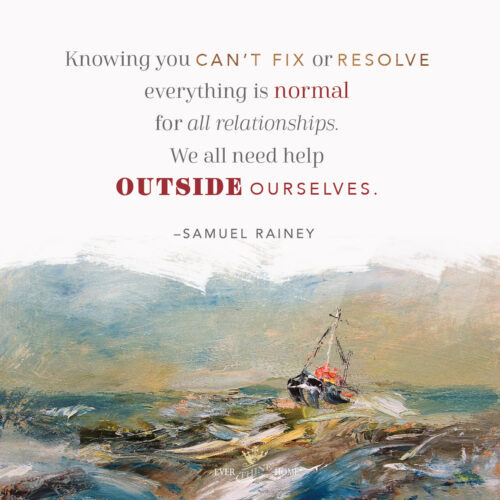
Needs allow us to recognize one of the most important truths about relationships: There is a God, and He is neither you nor me. When we can own this about ourselves and others, we give both of us room to fail and be imperfect. Failure is a part of being human, and thus speaking the words “I need help” is a sign of health and hope for your relationship.
Be careful about naming a want as a need. For instance, I might want my wife to apologize, but I don’t need her to do so in order to forgive her. Think of it this way: Wants are like creature comforts making your trip more enjoyable; needs are essential to the trip and your survival.
Before I get to the story of Alyssa and Tim, I hope you have found a few items that you need to make amends for (an action, feeling, or thought you had that was of ill-will towards the other). Making amends will be one of the best gifts you can offer the other person as you both work towards resolving the conflict.
Now let me introduce you to Alyssa and Tim. They’ve been married 12 years and have two girls ages 8 and 11. Lately they have been getting lost in conflict because Tim often mis-interprets what Alyssa says, and she feels like he often blames her. Neither of them can figure out why their minor disagreements inevitably turn into days-long fights.
In their last conflict, Alyssa told Tim that he was loud when he voiced his frustration about her forgetting it was her turn to pick up the kids from basketball practice. He rolled his eyes, said she was wrong, and went upstairs to watch TV.
She followed him upstairs and tried to resolve it, and it made things worse. They both yelled at each other and unearthed some resentments they had both been storing up for an occasion like this. Tim had enough, got up, and slammed the door as he left the room.
The next day Alyssa woke up and felt horrible about the night before. Not wanting to wait for days of silence and avoiding each other, Alyssa found the four questions we’d discussed in marriage counseling and got a piece of copy paper. She drew a line down the middle of the page and wrote “my side” at the top on the left, and then put “his side” on the right. She began writing, and this is what she came up with:
Data – What happened.I forgot it was my turn to pick up the kidsHe had to get them because I had Bible studyWhen he got home, I told him he was yellingHe told me I was wrongHe went upstairsI followed himWe yelled at each otherHe slept downstairsEmotions. What feelings came up?Ashamed for forgetting to get kidsGuilty for Tim having to go get themLike I’m a bad wife and motherAngry that our life is so busyExhausted by all the activitiesHurt by all the things he saidActions. What did I do?Forgot to get kids from basketballTold him of being too loud with his frustrationFollowed him upstairsYelled and insulted him for being mean to meDrank two glasses of wine before going to bedHelp. What I need to do or get help with?Need to apologize:For forgetting about getting the kidsFor choosing the wrong time to criticize his tone of voice when he got homeFor keeping the fight going by following him upstairsFor insulting him and yelling at him upstairsNeed help with:Need grace when I forget somethingNeed communication on our schedule because of how busy we areNeed to be a priority with time and attention. Dates. Gifts. EtcNeed to be reminded that I’m not a bad mom and wifeAfter she finished, she asked Tim if he would be willing to revisit what happened. She told him that she’d done the 4-questions exercise and that she wanted to share what she’d learned. He agreed and they went and sat on the porch.
The first thing she did was to apologize for the ways that she didn’t handle herself right or treat him well. These short and brief apologies set the stage for an incredibly productive conversation about what happened the night before. They were no longer reacting to each other. They were no longer defensive or at odds. Her apologies softened his heart. Her humility won him over (1 Peter 3:1). All of this added up to them reconciling the fight and found a couple of ways to care for each other better in the future.
Samuel Rainey is a marriage and family therapist.
The post 4 Questions to Help You Resolve Conflict appeared first on Ever Thine Home.
April 17, 2023
Making Peace with the “DMZ’s” in Your Marriage
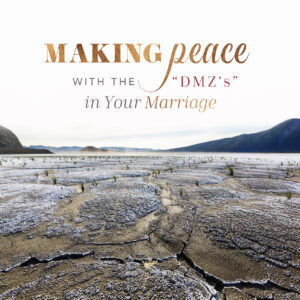
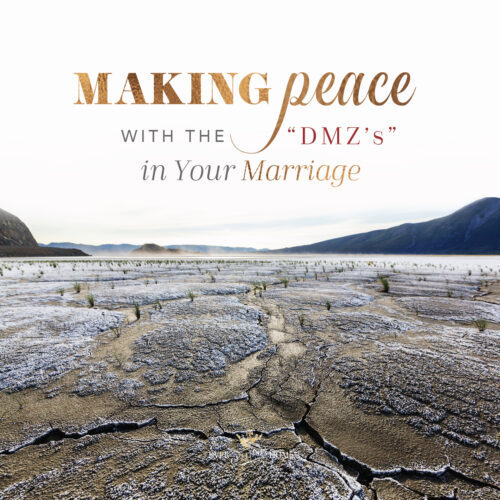
by Samuel Rainey
Note from Barbara: I’m pleased beyond words to welcome my son, Samuel Rainey, to the Ever Thine Home blog. I could write thousands of words about this man whom God has gifted uniquely to help men and women traverse choppy or turbulent waters in their marriages and lives. As a marriage and family therapist for 15+ years he has learned much in his practice of listening and listening and listening. Samuel is a man of deep wisdom, and it’s a delight and a gift to share him with all of you.
Amy came to me for counseling several years ago to get help with the growing disconnect in her marriage. She came alone because her husband refused to come with her. She described his reasoning pretty simply: “Steve had an affair eight years ago. We never talked about it then, and we’re not going to talk about it now.” What neither of them knew was that they had created a “DMZ” in their marriage.
DMZ is short for “demilitarized zone,” which describes an area of physical land that serves as a buffer between countries at war. Currently, the most notable DMZ is between North and South Korea. This strip of land was created at the end of the Korean War over 70 years ago as part of an armistice agreement. Its existence helps both countries operate independently of each other, even though they are technically still at war.
Unfortunately, the history of the Korean peninsula resembles the “emotional land” in many marriage relationships. In almost every marriage I’ve encountered (including my own!), conflict is a common occurrence. However, when no resolution is reached in these conflicts, couples create an emotional DMZ between each other.
DMZ’s are more about a ceasefire than they are about peace. But marriages will not thrive with DMZ’s. The moment a story or conflict is placed in the “off limits” category, knowingly or unknowingly, the couple has declared war on love, trust, and forgiveness — all components of thriving relationships. When a DMZ is established, the individual parties direct their attention primarily towards survival, and are only able to be around their spouse from an emotional distance.
I have seen couples create DMZ’s over finances, differing parenting styles and goals, time spent with in-laws, spiritual or church matters, and challenges relating to their sexual relationship. These issues get declared “off limits.” I’m not all that studied on international diplomacy, but ultimately the resolution of a DMZ comes down to one word: Peace. Enemies must make peace with one another for the fighting to end. The same is true for couples.
Here’s how you start the process of discussing a topic that is off limits—a DMZ—in your marriage.
Take off your shoes (literally).The DMZ in your marriage is holy ground. It’s where you feel pain, confront death, and seek hope. When Moses met God as the burning bush in Exodus 3, God told him to stop walking closer, and remove his sandals because he was standing on holy ground.
On one hand, this seems like an odd request. But think about it for a moment. When you are walking around outside without shoes (assuming the territory is somewhat rugged), you tend to be more careful with your steps. Your movements are slower and more deliberate. You become more aware of the jagged rocks or other objects that might cause pain to your bare feet.
When you engage in an attempt at resolving a past hurt with your spouse, take off your shoes. You might be surprised at what this symbolic act of “taking care” will do to your conversation. Let it remind you to be more aware of what’s happening between you and your spouse.
Unfold your arms.In the sermon on the mount, Jesus talks about storing up treasures in heaven, not on earth. We can apply Matthew 6:21 to much of our lives: “For where your treasure is, there your heart will be also.” When we engage in the DMZ’s of our marriage, we will confront where our treasures are, and our body language can illuminate that for us.
By crossing your arms, you are physically signaling that you’re protecting your heart, yourself. Defensiveness is a support of DMZ’s, not a way to make peace.
Protect what is valuable at all cost! When you unfold your arms, you are opening yourself up to your spouse. Treasure peace, not safety.
Listen twice, speak once.Proverbs 18:13 says this loud and clear: “If one gives an answer before he hears, it is his folly and shame.”
The reality is most of us do not listen very well. Listening is a posture of sacrifice. When we listen, we tell the other person that they are important, valuable, and worth being heard. Unfortunately we’re usually more interested in forming our rebuttal (defensive posture) than allowing the words, emotions, and energy to get to our heart.
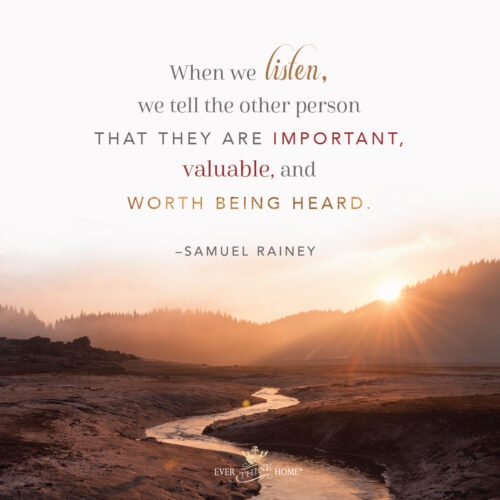
The cardinal rule in woodworking is to measure twice, and cut once. When we speak, we cut. You cannot undo a cut on a piece of wood just like you can’t unsay words that you’ve said.
Before you respond with what you want to say, reflect back to the other person the actual words they spoke and ask if you heard everything correctly (i.e., “I heard you say you feel like I don’t like you, and that I care more about work than I care about you. Is that right?”). Make sure that you’ve listened to what they have to say, and that you’ve heard it. Don’t be a fool (as the Proverbs warn) by speaking before you’ve listened.
Slow down.DMZ’s are established because of conflict, deep pain, and emotionally fearful interactions. One couple I met with saw me weekly for three months of counseling to resolve their DMZ about in-laws! I thought they had come to a peaceable solution when the husband decided to tear it all down with his comment of, “I’ll believe it when I see it.” In one moment, he undid all the work they’d been doing. If he would have slowed down and measured his words, he might not have said this.
Resolution and peace take time. It also requires you to slow down (remember point one about removing your shoes!) so that you don’t restart the war.
Here is one practical way to slow down: Take deep breaths. Decrease your heart rate. Increase blood flow to your body.
Studies have shown that when your heart rate gets above 100 beats per minute, your brain is unable to effectively process social interactions. You will miss out on vital information if you’re going too fast or if your heart is racing (this is called “getting flooded”). Relax your jaw, your fists, and your breath. It may sound hokey, but slowing your heart rate will better allow you to view the other person as a friend, not a foe.
Drop your weapons.You don’t walk into a peace treaty meeting with a machine gun. You won’t get very far in your attempts at peace with your spouse by bringing the relational weapons you are so adept at using. It’s really hard not to bring and use them when it appears that your spouse is not following the same guideline.
Remember this: When Jesus was betrayed and the soldiers came to the garden to arrest him, the disciples were ready to fight. At least one of them did, cutting off the ear of a soldier. What did Jesus do in response? He healed the man’s ear. If we are to become like Christ (Romans 8:29), practice offering a healing touch when a weapon has been used.
What are the weapons you use in marriage? Contempt? Stonewalling? Name calling?
Speaking the truth without love or care? Avoidance? Manipulation? Control? Rage?
Regardless of the weapon you use, leave it at the door. Perhaps even write it down and leave that piece of paper outside the room as a symbol of this action.
Practice gratitude.The number one antidote to the poison of bitterness, resentment, and contempt is gratitude. Be thankful. Express your gratitude. Exhaust your spouse with your praise. Be specific about what you appreciate about them. Let them know why you’re so thankful.
If you’re not offering thanks to your spouse for their efforts to live at peace with you, peace will be incredibly hard to come by. Be wary of how entitlement cheats gratitude (“she should know better…”, or “I shouldn’t have to tell you this…”). If you can’t find something to be thankful for, the issue is with you, not the other person.
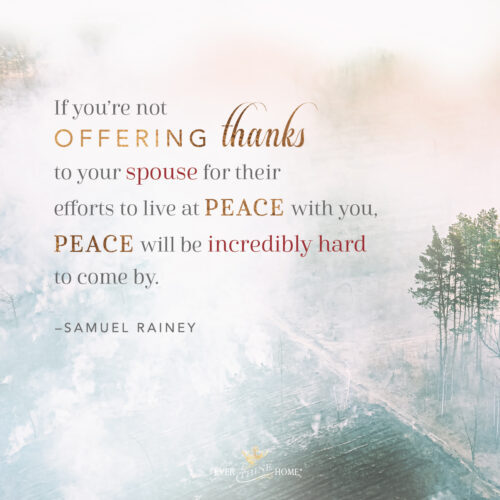
The presence of a DMZ on the Korean peninsula shows that the two countries remain in perpetual war with each other. Sure, there is no current fighting taking place, but don’t mistake that for peace. Peace will happen when they remove the line and agree to live together without the battles, conflicts, and violence that they are used to experiencing with each other.
As Paul tells us in Romans 12:18, “so far as it depends on you, live peaceably with all.” It only takes one person to transform a marriage. It does not take two. I’ve seen it over and over again.
When one person offers peace to an unwilling and defensive participant it changes the relationship. This is the invitation for you and your marriage.
Remove the DMZ line. Don’t wait for the other person to change first, they are likely waiting for the same thing.
Samuel Rainey is a marriage and family therapist.
The post Making Peace with the “DMZ’s” in Your Marriage appeared first on Ever Thine Home.
April 10, 2023
Savoring the Savior After His Resurrection
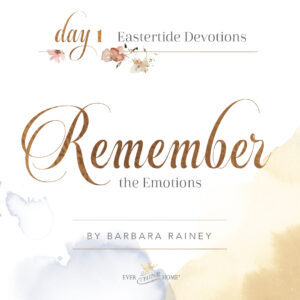
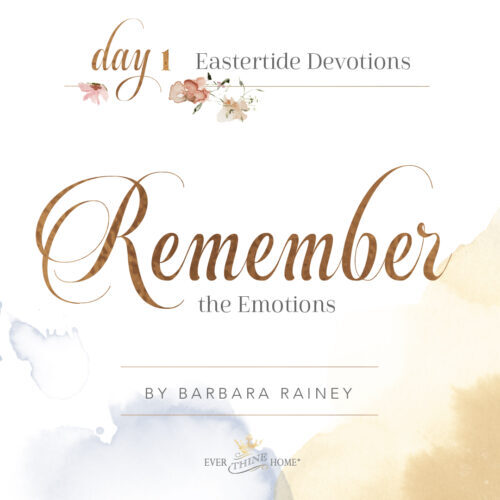
Introduction
In the historical church, the season between Easter Sunday and Pentecost is called Eastertide, a festive season for celebrating the risen Christ. Historically it lasted 40 days until Ascension Day, also called Holy Thursday, to mark the 40 days Jesus remained on earth before returning to heaven. In recent years, some church traditions have changed this season to include the additional ten days before Pentecost.
Celebration is an important element of our faith which we practice well at Christmas, but not at Easter. The question is how do we continue to celebrate Christ?
Without a guide for these days, we are a little lost. On our own we don’t know how to carry our Easter celebration with us past Resurrection Sunday. We also don’t know how to anticipate the coming church holy days—Ascension Day and Pentecost.
There is much to discover and learn in this 50-day season from the recorded appearances of Jesus after His resurrection and the last words He spoke on earth.
And there is so very much to remember.
Can’t you imagine the disciples in those early days and weeks after the Resurrection reliving it all over and over again? They must have said to one another, “How did we miss that?” Or “Do you remember Jesus said this to us?” And the one listening said, “You’re right! I do remember now! How could I have forgotten?”
And they must have asked one another, “Were you there when …” questions about so many events and miracles. And especially they relished those moments surrounding His last few days of life. To be near someone dying is to be on holy ground.
Hindsight can teach us a lot.
What did He say to His disciples in each appearance after the Resurrection? What does the Resurrection teach us about our lives and our faith? What did the disciples learn and see and understand that can guide us today?What did Jesus reveal about Himself that will carry us forward on our journey just as it did the 12 disciples and the thousands changed by the coming of the Spirit?So this year, to whet your appetite for the day when we produce a full 40-day devotional, we have one week of post-Easter devotions for our paid subscribers. We hope you will read these meditatively, learn more about Jesus, and continue to savor the Savior who gave His life for you and rose from the grave.
May you celebrate the Resurrection longer this year!
Day One: Remember the Emotions

Yesterday we marked the anniversary of the most miraculous moment since the dawn of time.
How would you evaluate the experience? This is not an evaluation of your church or pastor but your own heart. Were you distracted by the to-dos for your Easter brunch? Did you allow yourself to enter the experience of what actually happened that day in A.D. 33? In short, were you awed in any way?
Today, Monday, schools are back in session and the normal business of life has resumed. But is there any afterglow? Yes, there are tasks to be done, but while you are busy are you remembering the wonder of Easter? Or have you quickly forgotten because it’s the same every year? Is it just old news to you?
“Easter morning is the turning point of world history” writes Trevin Wax. So … let’s not leave the scene too quickly.
Come with me to gaze at a few details from Resurrection’s dawn with the clarity of hindsight and the Spirit’s illumination. Enter the story. To be changed by the miracle of it, we must keep it with us … closely, intimately, as a treasure.
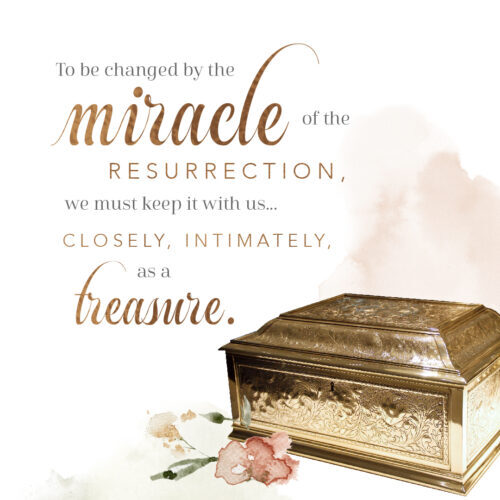
As the sun crested the horizon on the first Easter morn, its warmth touched a group of women gathered in the morning’s chill beside a stone tomb. The four Gospels name them in various groupings. Naming women as witnesses was unheard of in that era, but God valued their faith! He valued them as much as men because “ … God shows no partiality” (Romans 2:11). By listing them God helped us see them and their hearts of faith that pleased Him. They were Mary Magdalene; Mary, the mother of James; Mary, the mother of Jesus; Salome; Joanna; and others.
But … wait … why were no men present?
Was it typically the woman’s duty to care for the bodies of the departed? Or were the men kept away by the facts—Jesus was dead and everyone knows death is final. End of story.
Jesus was like family to these women! It was unthinkable not to go to the tomb because women are devoted to their families. They went to be near the One they loved, “that they might anoint Him” (Mark 16:1-2).
A pause on our journey back to the scene … and a question: Have you been willing to go near to Jesus even when He seemed dead … or silent … or unresponsive to you? What do you think of these women who did not hesitate?
Let’s look again at the scene of the tomb … closely now … because of their love for Jesus, the women dared to go near … and …
… they were the very first to discover the tomb was empty (John 20:1).
… they were the first to hear the news “He has risen, just as He said” (Matthew 28:5-7, Luke 24:6-7).
… they were the first to see Jesus alive (John 20:14-16).
… they were the first to believe and worship Him (Matthew 28:8-9).
Here at the tomb we see Jesus honor His female disciples who were quick to recognize and believe the impossible. Their deep love and their eager welcoming faith was abundantly rewarded.
Then they ran to share the good news!
In John’s Gospel, Mary Magdalene went to the tomb earlier than anyone else, and when she saw the stone had been rolled away she ran to tell Peter and John. Both got up and ran hurriedly to the tomb. Peter “saw” but John “saw and believed,” he wrote in John 20:6-8. Later, Jesus rebuked the disciples as a group for not believing the report of these faithful women. Mark 16:14 says, “He (Jesus) rebuked them for their unbelief and hardness of heart.”
What can we learn for today from these brief glimpses into the scene of that morning miracle?
First, belief in God is supremely important to Jesus. Though we waver often between belief and unbelief, Easter reminds us to always lean toward belief even if we feel crazy doing so, just as believing Jesus was actually alive felt crazy on that first Easter morning.
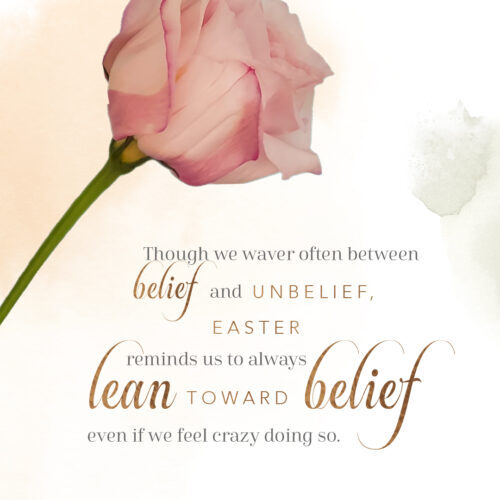
Another lesson is that God likes it when we choose to go to Him, to be near Him. James 4:8 tells us, “Draw near to God, and He will draw near to you.” Will you take steps toward Him? Your turning to Him will not go unnoticed.
Another profound truth from the death of Jesus is this: The end of the story is never the end of the story. You may be facing a dead end in your life, but the Resurrection is a reminder that God knows how to raise the dead.
Choosing to believe keeps the door open to what God wants to do. Choosing to believe is one way we remain awed by Jesus every day.
Allowing the wonder and miracles of the Resurrection to influence your life every day this week is another way we can live in the wonder of the Resurrection.
Today God’s word says to us, “Arise, shine, for your light has come, and the glory of the Lord has risen upon you” (Isaiah 60:1).
Christ is risen!
He is risen indeed!!!
For Eastertide reflection:
1. Since the Resurrection is the pivotal moment of history, why are Christians on the Monday after Easter back to normal as if nothing revolutionary happened? Why is Easter just an event we celebrate, with any wonder or awe we feel evaporated by nightfall? What are your thoughts about this?
2. Are you open to remaining stunned by this incomprehensible miracle? How can you remain awed by Jesus even as you return to ordinary living?
For Resurrection living today:
Author and theologian N.T. Wright wrote, “Easter is about the wild delight of God’s creative power. We should light every candle … celebrate in creative new ways. This is our great festival! We shouldn’t allow the secular world to throw us off course with its schedules, habits and parareligious events. If Calvary is about putting to death things in your life that need killing … then Easter should mean planting, watering and training things in your life to grow and in due course bear fruit.”
In light of this rightly orienting quote, what might you add to your life that will produce growth in Christ? What can you avoid this week of the secular world’s schedules and habits that will help you savor the wonder of the Resurrection?
When Jesus showed up after the Resurrection, once the shock wore off I imagine the disciples burst into a volley of questions. They didn’t get on their knees to talk to Him in prayer. He was with them!
Jesus is with us, too, so may I suggest you practice talking to Jesus out loud this week just as they did? Don’t think of it as prayer, but as inviting Him to participate with you in your day.
As you talk to Jesus, thank Him for what He did for you; thank Him for the beauty of spring days. And as you interact with the people in your life, ask Jesus to guide you and help you be more like Him to them. At the end of the day thank Him for being with you and ask Him to make your heart like the women who went to be near Him even though they never expected a response.
Remember Jesus’ silence never means He’s absent.
P.S. If you’d be willing to give me feedback on this seven-day devotional I’d love to hear from you as I work and prepare to add additional days for next year. To give me your feedback, click here to fill out a short survey. I’d be very grateful to hear from you.
The post Savoring the Savior After His Resurrection appeared first on Ever Thine Home.
Savoring the Savior after His Resurrection


Introduction
In the historical church, the season between Easter Sunday and Pentecost is called Eastertide, a festive season for celebrating the risen Christ. Historically it lasted 40 days until Ascension Day, also called Holy Thursday, to mark the 40 days Jesus remained on earth before returning to heaven. In recent years, some church traditions have changed this season to include the additional ten days before Pentecost.
Celebration is an important element of our faith which we practice well at Christmas, but not at Easter. The question is how do we continue to celebrate Christ?
Without a guide for these days, we are a little lost. On our own we don’t know how to carry our Easter celebration with us past Resurrection Sunday. We also don’t know how to anticipate the coming church holy days—Ascension Day and Pentecost.
There is much to discover and learn in this 50-day season from the recorded appearances of Jesus after His resurrection and the last words He spoke on earth.
And there is so very much to remember.
Can’t you imagine the disciples in those early days and weeks after the Resurrection reliving it all over and over again? They must have said to one another, “How did we miss that?” Or “Do you remember Jesus said this to us?” And the one listening said, “You’re right! I do remember now! How could I have forgotten?”
And they must have asked one another, “Were you there when …” questions about so many events and miracles. And especially they relished those moments surrounding His last few days of life. To be near someone dying is to be on holy ground.
Hindsight can teach us a lot.
What did He say to His disciples in each appearance after the Resurrection? What does the Resurrection teach us about our lives and our faith? What did the disciples learn and see and understand that can guide us today?What did Jesus reveal about Himself that will carry us forward on our journey just as it did the 12 disciples and the thousands changed by the coming of the Spirit?So this year, to whet your appetite for the day when we produce a full 40-day devotional, we have one week of post-Easter devotions for our paid subscribers. We hope you will read these meditatively, learn more about Jesus, and continue to savor the Savior who gave His life for you and rose from the grave.
May you celebrate the Resurrection longer this year!
Day One: Remember the Emotions

Yesterday we marked the anniversary of the most miraculous moment since the dawn of time.
How would you evaluate the experience? This is not an evaluation of your church or pastor but your own heart. Were you distracted by the to-dos for your Easter brunch? Did you allow yourself to enter the experience of what actually happened that day in A.D. 33? In short, were you awed in any way?
Today, Monday, schools are back in session and the normal business of life has resumed. But is there any afterglow? Yes, there are tasks to be done, but while you are busy are you remembering the wonder of Easter? Or have you quickly forgotten because it’s the same every year? Is it just old news to you?
“Easter morning is the turning point of world history” writes Trevin Wax. So … let’s not leave the scene too quickly.
Come with me to gaze at a few details from Resurrection’s dawn with the clarity of hindsight and the Spirit’s illumination. Enter the story. To be changed by the miracle of it, we must keep it with us … closely, intimately, as a treasure.

As the sun crested the horizon on the first Easter morn, its warmth touched a group of women gathered in the morning’s chill beside a stone tomb. The four Gospels name them in various groupings. Naming women as witnesses was unheard of in that era, but God valued their faith! He valued them as much as men because “ … God shows no partiality” (Romans 2:11). By listing them God helped us see them and their hearts of faith that pleased Him. They were Mary Magdalene; Mary, the mother of James; Mary, the mother of Jesus; Salome; Joanna; and others.
But … wait … why were no men present?
Was it typically the woman’s duty to care for the bodies of the departed? Or were the men kept away by the facts—Jesus was dead and everyone knows death is final. End of story.
Jesus was like family to these women! It was unthinkable not to go to the tomb because women are devoted to their families. They went to be near the One they loved, “that they might anoint Him” (Mark 16:1-2).
A pause on our journey back to the scene … and a question: Have you been willing to go near to Jesus even when He seemed dead … or silent … or unresponsive to you? What do you think of these women who did not hesitate?
Let’s look again at the scene of the tomb … closely now … because of their love for Jesus, the women dared to go near … and …
… they were the very first to discover the tomb was empty (John 20:1).
… they were the first to hear the news “He has risen, just as He said” (Matthew 28:5-7, Luke 24:6-7).
… they were the first to see Jesus alive (John 20:14-16).
… they were the first to believe and worship Him (Matthew 28:8-9).
Here at the tomb we see Jesus honor His female disciples who were quick to recognize and believe the impossible. Their deep love and their eager welcoming faith was abundantly rewarded.
Then they ran to share the good news!
In John’s Gospel, Mary Magdalene went to the tomb earlier than anyone else, and when she saw the stone had been rolled away she ran to tell Peter and John. Both got up and ran hurriedly to the tomb. Peter “saw” but John “saw and believed,” he wrote in John 20:6-8. Later, Jesus rebuked the disciples as a group for not believing the report of these faithful women. Mark 16:14 says, “He (Jesus) rebuked them for their unbelief and hardness of heart.”
What can we learn for today from these brief glimpses into the scene of that morning miracle?
First, belief in God is supremely important to Jesus. Though we waver often between belief and unbelief, Easter reminds us to always lean toward belief even if we feel crazy doing so, just as believing Jesus was actually alive felt crazy on that first Easter morning.

Another lesson is that God likes it when we choose to go to Him, to be near Him. James 4:8 tells us, “Draw near to God, and He will draw near to you.” Will you take steps toward Him? Your turning to Him will not go unnoticed.
Another profound truth from the death of Jesus is this: The end of the story is never the end of the story. You may be facing a dead end in your life, but the Resurrection is a reminder that God knows how to raise the dead.
Choosing to believe keeps the door open to what God wants to do. Choosing to believe is one way we remain awed by Jesus every day.
Allowing the wonder and miracles of the Resurrection to influence your life every day this week is another way we can live in the wonder of the Resurrection.
Today God’s word says to us, “Arise, shine, for your light has come, and the glory of the Lord has risen upon you” (Isaiah 60:1).
Christ is risen!
He is risen indeed!!!
For Eastertide reflection:
Since the Resurrection is the pivotal moment of history, why are Christians on the Monday after Easter back to normal as if nothing revolutionary happened? Why is Easter just an event we celebrate, with any wonder or awe we feel evaporated by nightfall? What are your thoughts about this?Are you open to remaining stunned by this incomprehensible miracle? How can you remain awed by Jesus even as you return to ordinary living?For Resurrection living today:
Author and theologian N.T. Wright wrote, “Easter is about the wild delight of God’s creative power. We should light every candle … celebrate in creative new ways. This is our great festival! We shouldn’t allow the secular world to throw us off course with its schedules, habits and parareligious events. If Calvary is about putting to death things in your life that need killing … then Easter should mean planting, watering and training things in your life to grow and in due course bear fruit.”
In light of this rightly orienting quote, what might you add to your life that will produce growth in Christ? What can you avoid this week of the secular world’s schedules and habits that will help you savor the wonder of the Resurrection?
When Jesus showed up after the Resurrection, once the shock wore off I imagine the disciples burst into a volley of questions. They didn’t get on their knees to talk to Him in prayer. He was with them!
Jesus is with us, too, so may I suggest you practice talking to Jesus out loud this week just as they did? Don’t think of it as prayer, but as inviting Him to participate with you in your day.
As you talk to Jesus, thank Him for what He did for you; thank Him for the beauty of spring days. And as you interact with the people in your life, ask Jesus to guide you and help you be more like Him to them. At the end of the day thank Him for being with you and ask Him to make your heart like the women who went to be near Him even though they never expected a response.
Remember Jesus’ silence never means He’s absent.
P.S. If you’d be willing to give me feedback on this seven-day devotional I’d love to hear from you as I work and prepare to add additional days for next year. To give me your feedback, click here to fill out a short survey. I’d be very grateful to hear from you.
The post Savoring the Savior after His Resurrection appeared first on Ever Thine Home.
Barbara Rainey's Blog
- Barbara Rainey's profile
- 24 followers








